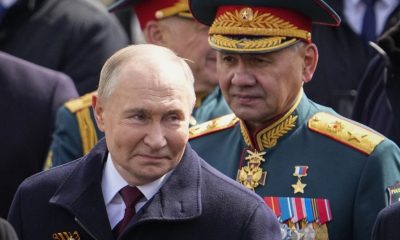General News
Moscow vows to retaliate after deadly border city attack

The apparent Ukrainian strikes come the day after at least 39 civilians were killed in Russian attacks on Ukraine.
The Kremlin has vowed to retaliate following a wave of deadly Ukrainian strikes on Saturday.
It accused Ukraine’s forces of shelling Belgorod, killing 14 people and injuring 108 others.
Kyiv has not commented directly on the situation.
Two children were among the dead in the Russian border city, regional governor Vyacheslav Gladkov said in a statement on social media.
Russia’s Defence Ministry said it identified the ammunition used in the strike as Czech-made Vampire rockets and Olkha cluster munitions. It provided no additional information.
Euronews could not independently verify Moscow’s claim.
“This crime will not go unpunished,” the ministry said in a statement on social media.
Though past attacks on the Belgorod region have typically happened at night, social media images on Saturday showed fires in the centre of the city, with cars ablaze and plumes of smoke pouring from buildings.
One strike hit close to a public ice rink in the very heart of the city.
Air raid sirens sounded across the city, state media reported.
Earlier on Saturday, drones were seen in the skies over Russia’s Moscow, Bryansk, Oryol, and Kursk regions, the country’s defence ministry said in a statement.
It did not report any casualties and said all of the drones had been destroyed by air defences.
Cities across western Russia have come under regular attack from drones since May, with Russian officials blaming Kyiv.
Ukrainian officials never acknowledge responsibility for attacks on Russian territory or the Crimean peninsula. However, larger aerial strikes against Russia have previously followed heavy assaults on Ukrainian cities.
Moscow’s forces launched 122 missiles and dozens of drones across Ukraine Friday, an onslaught described by one air force official as the biggest aerial barrage of the war.
At least 160 people were wounded and an unknown number were buried under rubble in the assault, which damaged a maternity hospital, apartment blocks, and schools.
The UK’s Defence Secretary Grant Shapps vowed to provide 200 air defence missiles to help Ukraine defend itself against future attacks.
Western officials and analysts recently warned that Russia limited its cruise missile strikes for months in an apparent effort to build up stockpiles for massive strikes during the winter, hoping to break the Ukrainians’ spirit.
Fighting along the front line is largely bogged down by winter weather after Ukraine’s summer counteroffensive failed to make a significant breakthrough along the roughly 1,000-kilometre (620-mile) line of contact.
Questions remain as to why Ukraine is still sending drone attacks when they tend not to have the desired effect.
Against the backdrop of its gritty counteroffensive, the nation continues to fire drone after drone deep inside Russian territory, targeting Moscow especially.
Yet, bar some exceptions, most strikes lack a clear military objective and almost always cause no casualties or damage – especially when they are often intercepted by Russian air defences.
Experts told Euronews in September a key element is psychological warfare, with Ukraine trying to boost morale at home by showing offensive power. However, others suggested military motives also existed. Read more on this story here.
Source
Disclaimer: No copyright infringement intended. All rights and credits reserved to respective owner(s).
























